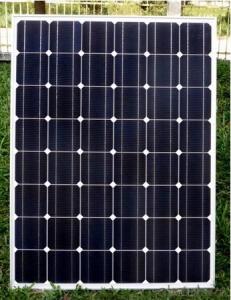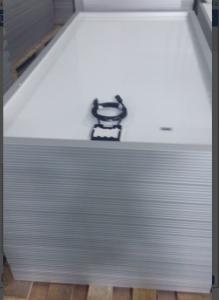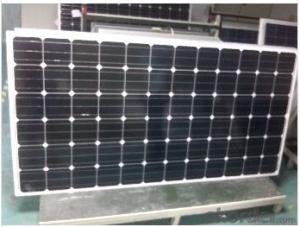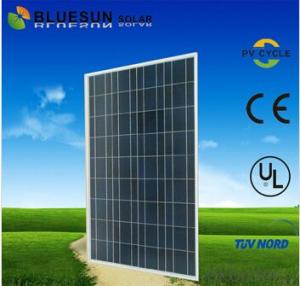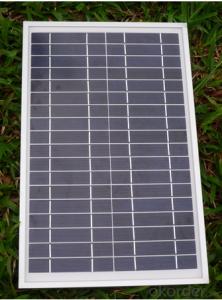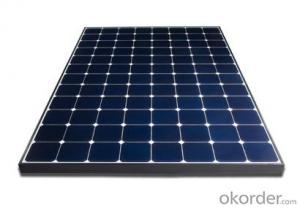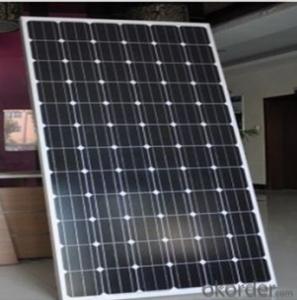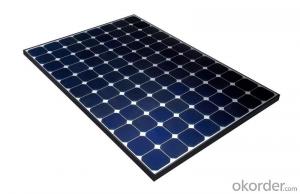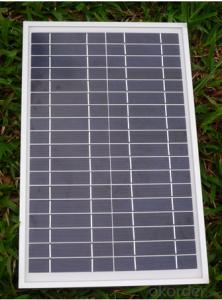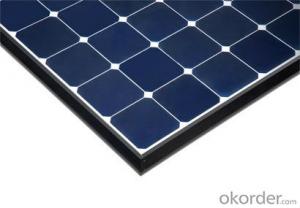Green Roof Compatible Poly Solar Panel 295W B Grade - Cheapest Price
- Loading Port:
- Shanghai
- Payment Terms:
- TT OR LC
- Min Order Qty:
- 100 watt
- Supply Capability:
- 10000 watt/month
OKorder Service Pledge
OKorder Financial Service
You Might Also Like
Specification
Poly Solar Panel 295W B Grade with Cheapest Price
Product description
A solar cell, or photovoltaic cell (in very early days also termed "solar battery"[1] – a denotation which nowadays has a totally different meaning, see here), is an electrical device that converts the energy of lightdirectly into electricity by the photovoltaic effect, which is a physical and chemical phenomenon.[2] It is a form of photoelectric cell, defined as a device whose electrical characteristics, such as current, voltage, or resistance, vary when exposed to light. Solar cells are the building blocks of photovoltaic modules, otherwise known as solar panels.
Solar cells are described as being photovoltaic irrespective of whether the source is sunlight or an artificial light. They are used as a photodetector (for example infrared detectors), detecting light or other electromagnetic radiation near the visible range, or measuring light intensity.
A photovoltaic (in short PV) module is a packaged, connected assembly of typically 6×10 solar cells. Solar Photovoltaic panels constitute the solar array of a photovoltaic system that generates and supplies solar electricity in commercial and residential applications. Each module is rated by its DC output power under standard test conditions, and typically ranges from 100 to 365 watts. The efficiency of a module determines the area of a module given the same rated output – an 8% efficient 230 watt module will have twice the area of a 16% efficient 230 watt module. There are a few solar panels available that are exceeding 19% efficiency. A single solar module can produce only a limited amount of power; most installations contain multiple modules. A photovoltaic system typically includes a panel or an array of solar modules, a solar inverter, and sometimes a battery and/or solar tracker and interconnection wiring.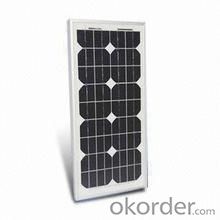
Application
Business
Home
Industry
Large project
Feature
1. A grade high efficiency solar cells.
2.TUV/UL/CE/CEC etc
3.Fast shippment
4.25 years warranty
5.OEM/ODM
Packaging
28pcs into one carton
Shipping
Material in stock can be produced (procedure 5-20days) right away after pre-payment confirmation. COSCO Mearsk MSCship to worldwide for safe shipping, don't worry about package damage or loss. It takes about 15-40 days to worldwide, Please note us your contact details include your phone number for easy contacting from shipping company officer.
- Q: Can solar panels be used on commercial buildings?
- Yes, solar panels can be used on commercial buildings. In fact, many businesses are increasingly installing solar panels on their rooftops to generate clean and sustainable energy. This helps them reduce their reliance on traditional energy sources, lower their electricity bills, and contribute to a greener environment. Additionally, government incentives and tax benefits often make solar panel installations a financially viable option for commercial buildings.
- Q: Do solar panels work during a power outage?
- No, solar panels do not work during a power outage unless they are connected to a battery storage system.
- Q: please no dumb answers and list where you got the info.Also how much does it cost to install solar panels for a regular sized house?
- Short version is that the sunlight knocks electrons loose from a semiconductor panel, and those loose electrons generate an electrical current. The solar panels have lots of cells arranged in series parallel to get to a higher voltage (usually 2 or 24 volts) and current. This is sent to charge batteries under the control of a charge controller. The voltage from the batteries is sent to an inverter that converts the 2/24 volts to 20/240 VAC for household usage. .
- Q: How much energy can a solar panel produce in a day?
- The amount of energy a solar panel can produce in a day depends on various factors such as the size and efficiency of the panel, location, weather conditions, and sunlight exposure. On average, a typical residential solar panel can generate around 4 to 6 kilowatt-hours (kWh) of electricity per day. However, this value can vary significantly and may be higher or lower based on the aforementioned factors.
- Q: Solar panel for battary charging
- Check the rating on the battery. Either look on the label, or look up the exact manufacturer's part number on the internet. There should be an amp-hour (AH) rating. It's very doubtful that the battery is 65 AH, by the way. When you get the amp-hour rating, people can advise you further.
- Q: How do solar panels affect the property's energy management strategy?
- Solar panels can significantly impact a property's energy management strategy by providing a renewable and sustainable source of electricity. By harnessing solar energy, the property can reduce its dependence on traditional power sources, lower energy costs, and decrease its carbon footprint. Solar panels can also help to stabilize energy prices, as they generate electricity during peak demand periods, reducing the need to purchase electricity from the grid. Additionally, solar panels can provide a reliable source of backup power during grid outages, enhancing the property's energy resilience. Overall, solar panels offer numerous advantages to a property's energy management strategy, promoting sustainability, cost savings, and energy independence.
- Q: Can solar panels be installed on a deck or patio?
- Yes, solar panels can be installed on a deck or patio. However, it is important to consider certain factors such as the structural integrity of the deck or patio, the amount of sunlight it receives, and any regulations or restrictions in your area. Additionally, it is recommended to consult with a professional installer to ensure proper installation and maximize the efficiency of the solar panels.
- Q: i trying to make a solar panel. right now i dont have money to go and buy a copper sheet. so can i make it out of aluminum foil. if there is a way please tell me how. and what do i use for wires. i making this to charge batteries.
- No but look in youtube for other ways of charging batteries . There is allot of neat ideas like building a small wind generator from scrap parts such as old speaker magnets copper wire out of transformers things that most people toss in the junk .
- Q: Can solar panels be installed on residential homes?
- Yes, solar panels can be installed on residential homes. In fact, many homeowners choose to install solar panels on their roofs to generate clean and renewable energy for their homes, reducing electricity costs and environmental impact.
- Q: What are the different types of solar panels?
- There are three main types of solar panels: monocrystalline, polycrystalline, and thin-film. Monocrystalline panels are made from a single crystal structure, making them highly efficient but also more expensive. Polycrystalline panels are made from multiple crystal structures, offering a slightly lower efficiency but a more affordable price. Thin-film panels are made by depositing a thin layer of semiconductor material onto a substrate, making them flexible and lightweight, but with lower efficiency compared to crystalline panels.
Send your message to us
Green Roof Compatible Poly Solar Panel 295W B Grade - Cheapest Price
- Loading Port:
- Shanghai
- Payment Terms:
- TT OR LC
- Min Order Qty:
- 100 watt
- Supply Capability:
- 10000 watt/month
OKorder Service Pledge
OKorder Financial Service
Similar products
Hot products
Hot Searches
Related keywords
